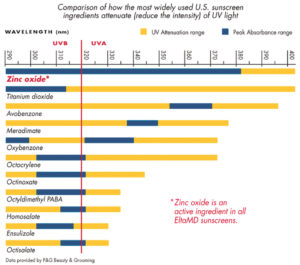By Gil Cortes, MD, FAAD
 Ultraviolet, or UV rays, are part of the invisible energy that comes from the sun. UVA (aging) rays account for 95% of our sun exposure.
Ultraviolet, or UV rays, are part of the invisible energy that comes from the sun. UVA (aging) rays account for 95% of our sun exposure.
They cause skin aging and contribute to skin cancer. UVA rays penetrate deeply into the skin layers, damaging collagen and cells which leads to wrinkling, hyperpigmentation and loss of elasticity. UVB (burning) rays mostly affect the outer layer of the skin. They cause sunburns and tanning that increase the risk of skin cancer and other disorders. The risk for skin cancer doubles in people who have had five or more sunburns. Skin Cancer Foundation (Nov. 2010)
To minimize UV damage to skin, sunscreen protection is available, but knowing what brand or type to use can be difficult for patients. Dr. Gil Cortes MD, FAAD, a boardcertified Dermatologist at NOVU Dermatology in Lady Lake – The Villages, has some advice to offer patients. “I see patients who are using chemical only sunscreens, who should be using sun protectants with physical blockers. Chemical only sunscreens protect against UVB rays, and will prevent sunburns, but have minimal effect on UVA rays, which cause skin aging, hyperpigmentation and increase risk for skin cancer.
Zinc oxide, is a natural, mineral compound. Because zinc maintains its protective ability in the sun, it is more photostable than some chemical ingredients that may degrade.
Zinc sunscreen blocks the widest spectrum of UVA and UVB rays, protecting skin against burning and the premature appearance of aging and risk of skin cancer. Zinc is safe for even the most sensitive skin types.
How important is SPF? Is 100+SPF the way to go or are ingredients like Zinc and Titanium more important? According to Dr. Cortes, “The most important thing is ingredients. Once you have established that your sunscreen has either Zinc or Titanium, then you should look at the percentage of it in the product. A minimum of 10% or ideally 20% of combined Zinc and Titanium or just one of the two is acceptable.”
What sunscreen brand do Dermatologists recommend and why? “As far as brand, there are many good sunscreens available, I personally recommend three brands, First on my list is ELTA MD, because all their products contain Zinc and they also sell a completely chemical free sunscreen with combined zinc and titanium to an approximate 20%. Elta is excellent for sensitive skin. The lightly tinted sunscreens are easy to use daily, without risk of rubbing in the product too thin. As a close runner up, Shiseido, makes an excellent sun protectant, which also offers the option of tint, with or without combined chemical sun protectants. Shiseido’s formulation is quite unique so that it stays on the skin better than most brands. For sun protection during sports or water activities, it is a great option for lasting protection. For my number three choice, Nutrogena has a SheerZinc sunscreen which contains zinc at a near 20% and no chemicals. It looks very much like the chemical sunscreens they sell and can be easily confused, so you do need to read the ingredients on the label. Always remember the best protection for sun damage is protective clothing, hats and sunglasses, especially when outdoors at peak hours from 10AM to 4PM.
Chemical sunscreens are unstable and degrade with sunlight, limiting their effectiveness. They are a major cause of allergic contact dermatitis and are not ideal for sensitive skin. Recent studies have shown that chemical sunscreens build up in the bloodstream and may be unsafe. In addition, they are damaging to coral reefs. Chemical free sunscreens are therefore not only better for you, they are better for the environment.
Gil Cortes, MD, FAAD
Dermatologist
NOVU Dermatology
(352) 775-3565
www.novudermatology.com
Rolling Oaks Professional Plaza
929 N. US Hwy 441 Suite 603
Lady Lake, FL 32159
Tags featured
Check Also
Why Choose Stem Cell Therapy?
By Trevor Ferguson, DC Of the available Non-Surgical Pain Relief Therapy procedures, stem cell therapy …
 Central Florida Health and Wellness Magazine Health and Wellness Articles of the Villages
Central Florida Health and Wellness Magazine Health and Wellness Articles of the Villages



